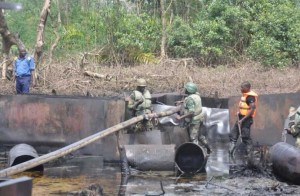
The Nigerian Navy says it has discovered 30 new illegal refineries with combined capacity to produce about four million litres of petroleum products daily.
The Executive Officer of the Nigerian Navy Ship (NNS) Pathfinder, Port Harcourt, Capt. Victor Choji, said this during the destruction of one of the illegal refineries on Thursday.
He said all the illegal refineries were discovered in Asari Toru Local Government Area of Rivers with 40 huge metallic storage tanks . Some of the storage tanks were filled with petroleum products suspected to be diesel and crude oil.
According to Choji, the discovery was in continuation of the current mop-up of illegal refineries and illicit bunkering of petroleum products by crude oil thieves.
“The discovery was in compliance with the Chief of the Naval Staff (CNS), Vice Adm. Ibok-Ete Ibas strategic directive to rid Rivers of all forms of maritime illegalities.
“Following this directive, troops started an onslaught and discovered the very heart of the production line and infrastructure of illegal bunkering at Iyalama community in Asari Toru LGA of Rivers.
“The 30 refineries have capacity to refine between three to four million litres of diesel daily – which is quite massive.
“The sizes of the illegal refineries show that the LGA is indeed the epicentre of illegal bunkering activities in the state,” he said.
Choji said the navy had deployed a “Swamp Buggy” machine with intent to reduce the ability of operators of the illicit enterprises to revive the illegal refineries.
He said the use of the machine was part of the new strategy which involves complete crushing of metal tanks rather than setting both storage tanks and petroleum products ablaze. The new strategy, he said, was adopted following reports that burning of illegal refineries was partly responsible for the current air pollution in Port Harcourt.
Choji, who said the navy was committed to protecting the environment and health of residents, gave an assurance that it would carry out its mandate in line with global best practices.